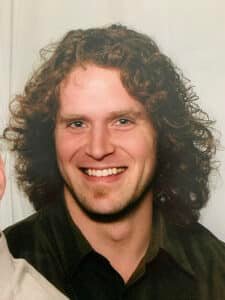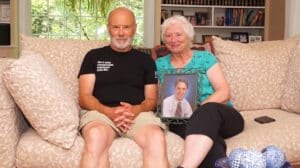By Mike Costanza

John and Judy Messenger remember the day in 2012 when they heard a knock on the door of their Pittsford home.
When they opened it, two policemen told them that James, their 30-year-old son, had taken his own life.
Almost 12 years later, they still wonder why he left them that way.
“We have no idea what was going on in his mind or why he did it,” Judy said.
James, the second of the Messenger’s three sons, was easygoing, kind and sensitive to the feelings of others.
“I used to say he was exactly like me, only younger, taller, better-looking and more talented,” John said.
James had a talent for music, played the trumpet, guitar and keyboards and sang in his family’s church and at school events — he played Daddy Warbucks in his middle school’s production of “Annie.” As a young man, he played his guitar and sang in local coffee houses and toured Europe with Mastersingers USA, the top-notch men’s chorus of which John is a member. He also enrolled at Syracuse University, intent upon acquiring a degree in communications, but dropped out after two years. He lived in Syracuse for a while, then spent several years living with his parents. During that time, he became a deacon in the First Presbyterian Church of Pittsford, the house of worship his family attended.
By the time of his death, James had long grappled with mental health issues. He heard voices and sometimes carried on conversations under his breath with people who didn’t exist. In his early 20s, he was diagnosed with schizoaffective disorder and bipolar disorder and ended up being hospitalized three times for brief periods.

Those suffering from schizoaffective disorder can experience a mix of symptoms, including visual and auditory hallucinations, delusions, depression and mania. Bipolar disorder manifests itself in extreme mood swings. The person diagnosed might feel euphoric one moment and depressed the next. Both conditions require treatment with medications and counseling. Those who do not obtain treatment are at a greater risk of suicide than the general population.
James obtained treatment for his disorders, but sometimes did not take his medications as required. In addition, he sometimes drank heavily and smoked marijuana, reducing the drugs’ effectiveness. As his disorders and use of alcohol and marijuana took their toll, James lost interest in the things he’d once enjoyed.
“He was failing,” Judy said. “He wasn’t taking care of himself.”
As James struggled, the Messengers had to deal with their own issues. Both were laid off from their jobs in 2012 — John was an in-house attorney and Judy was a regulatory analyst and manager for a local telecom firm. By October of that year, Judy had retired and John was hunting for a new position and doing freelance legal work. The couple was also preparing to sell their Pittsford home and move into a new, smaller residence in Brighton.
Oct. 8, 2012, was a bright, sunny fall day, according to John. He took James to a local Bruegger’s Bagels shop for a sandwich, then home for a visit. James spent hours in his parents’ backyard alone, then joined them for dinner. After that, John drove him to Pinnacle Place, the Rochester high-rise in which he was living.
James hugged his mother just before he left, a gesture that struck Judy, since he had grown distant from her down through the years. At 5 o’clock the next morning, she and John learned from the police that James had jumped from the roof of Pinnacle Place. He was just shy of his 31st birthday.
The news of James’ death hit the Messengers hard.
“We had just spent the previous afternoon and evening with him at our house and everything seemed fine,” Judy said. “If anything, he was a little bit more friendly than he had sometimes been.”
Each of the Messengers reacted to the loss in their own way.
“I think in each of our separate ways, we were a little bit on autopilot and in shock and therefore doing practical things, because it was so hard to process fully,” John said.
Judy offered coffee and breakfast to the officers, which they declined.
“I was trying to process the whole thing, because it didn’t make sense to me,” she said.
John wanted to learn more about the way James died. After the two police officers left, he dressed and drove to Pinnacle Place. The night security guard was still on duty.
“He took me out and showed me a bush that had been crushed by his [James’] fall,” John said.
The couple then started the long, painful journey through their grief.
“Even in the course of a conversation, you experience several different ways of experiencing the grief,” Judy said.
Anger was part of that experience.
“There’s some anger with yourself that you missed it,” she said. “How could you not see the signs?”
Some of that anger was reserved for James.
“I was angry with him for doing it,” she said.
Though family members, friends and members of First Presbyterian offered their support, Judy began working through her feelings on her own.
“A lot of it is being left alone to process through myself,” she said.
Though she turned to some of the women in her church, it wasn’t for sympathy.
“They were just there,” she said. “I knew that if I needed them, they were available to me.”
John was also there for her.
“He was my rock, my support,” she said. “I knew that if I had a question, a concern, I could always go with him.”
John was much more comfortable talking to others about the loss of James.
“Judy and I have a great relationship, but we deal with certain things differently,” he said.
John turned to friends, relatives and members of his church to talk about his loss, including Tim Smith, a friend from First Presbyterian who is a Stephen Minister. Stephen Ministers are specially trained, volunteer lay counselors who provide one-to-one, Christ-centered care to people who are experiencing life difficulties.
“I tend to want to talk things out. [Judy] often processes things first to herself,” John said. “It was helpful to have some third person to talk to.”
The couple also found they could draw comfort from helping others who had lost someone to suicide or had relatives or friends who were at risk of taking their own lives.
“Both of us, I think, get a lot of our value and purpose in life from helping other people,” Judy said. “I think we are empathetic for someone who has gone through this.”
First Presbyterian’s associate pastor began referring members of her congregation to them for assistance.
“Folks who had someone who was considering suicide or had mental illness of some degree would come and talk to us,” Judy said.
The couple has continued to make themselves available since moving to Rochester’s Asbury First United Methodist Church a few years ago. In addition, Judy volunteers as an office manager for NAMI Rochester, the local chapter of the National Alliance on Mental Illness and makes herself available to talk to those in need.
“When we get a call from NAMI that someone has lost a child, that call comes to me,” Judy said.
Though it’s been 12 years since James left them, he is never far from his parents’ thoughts. They have wind chimes hanging from their car’s rear-view mirror that they bought to remind them of James.
“Whenever they play, I think it’s James talking to me,” Judy said. “It’s just lovely.”
The Messengers moved into a new home in Brighton in 2013. John landed a job that year as an attorney for a local firm and remained in that position until he retired in 2021. As he looks back on the years since James took his own life, he marvels at the way he and Judy have come through them.
“This is the sort of thing that has a lot of collateral damage and we’ve been very aware and lucky that we’re both very strong and resilient people and we have a fabulous relationship,” he said. “If anything, it made us stronger together.”

